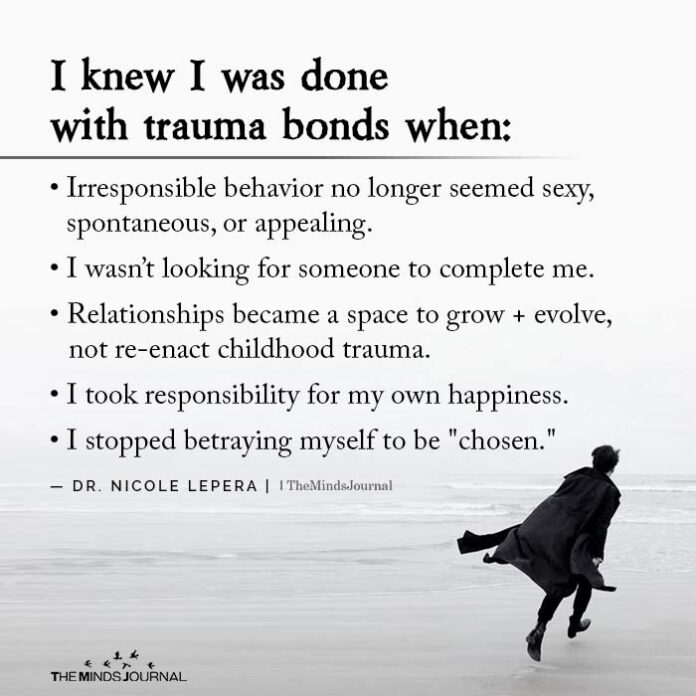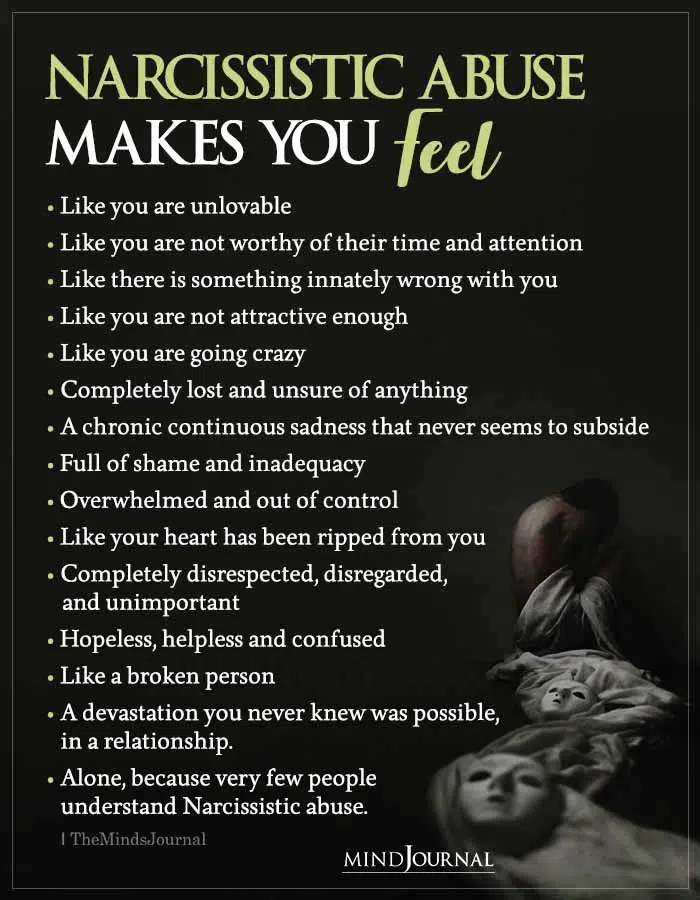Why is it so hard to leave a narcissist? Especially leaving a narcissist you love? Leaving a narcissist is sometimes easier said than done, because of the traumatic attachment you might have built up over time. Let’s find out why is it hard to leave a narcissist.
By Dr. Elinor Greenberg
I am seeing more and more people in my office who tell me some version of the following story:
I used to be a really confident and mentally healthy person. I had a good job, lots of friends, and I was happy most of the time.
Now I am a total wreck. I can’t concentrate on my work and I feel as if I am going crazy. I know that I am in a really destructive relationship with a Narcissist who abuses me, but somehow, I can’t manage to leave once and for all.
This person used to be incredibly loving to me, but now they treat me like dirt. I don’t understand what is happening or what I have done that makes them treat me this way.
I love them so much! I have tried to leave, but each time I come back the moment that they start being nice to me again. I literally cannot make myself stay away. Can you help me?
Related: We Often Stay In Abusive Relationships Because of Trauma Bonding
Why is it so hard to leave the abusive Narcissist in your life?
If the above story resonates with you, and you too have found yourself begging for crumbs of affection from an abusive person with Narcissistic Personality Disorder, I may be able to help you understand how you got here—and why you are finding it so hard to just walk away and not look back.
The answer is that you have become “Trauma Bonded” to this person through a blend of “Intermittent Reinforcement” and “Stockholm Syndrome.”
What is “Narcissistic Trauma Bonding”?
Humans are wired to emotionally bond with the people around them. This ability to bond is the glue that keeps families and relationships together.
When we feel endangered or insecure our natural reaction is to reach out to those we are bonded with for protection. But what happens when the person we are bonded to is the one who is mistreating us? Then our tendency to bond works against us.
Under normal circumstances, we might be able to walk away from our abuser and look for help elsewhere. Unfortunately, the conditions that create trauma bonding are not at all normal.
With “Narcissistic Trauma Bonding,” you are initially showered with intense love and approval. It is like a fantasy come true.
Then gradually the ratio of positive to negative events shifts—often so subtly that you cannot say exactly when this happened. You find yourself in fights with someone you desperately love who claims that everything bad that is happening is all your fault.
Unless you walk out immediately and never look back, you are well on your way to becoming this person’s psychic prisoner. You will find yourself “Trauma Bonded” with someone who is destroying you.
This is like your own personal opiate addiction crisis. You are now addicted to this person’s approval and only desire their love and no one else’s. You know you should stop, but you do not have the willpower to do so on your own.

The 7 Stages of Narcissistic Trauma Bonding
Stage 1: “Love Bombing”
The Narcissist showers you with love and validation.
Stage 2: Trust and Dependency
You start to trust that they will love you forever. You now depend on them for love and validation.
Stage 3: Criticism Begins
They gradually reduce the amount of love and validation that they give you and start to criticize you and blame you for things. They become demanding.
Related: 5 Signs You Are In A Trauma Bond
Stage 4: “Gaslighting”
They tell you that this is all your fault. If you would only trust them and do exactly as they say, they would shower you with love again. They try to make you doubt your own perceptions and accept their interpretation of reality.
Stage 5: Control Is Established
You do not know what to believe but think that your only chance of getting back the good feelings of Stage 1 is to try doing things their way.
Stage 6: Resignation and Loss of Self
Things get worse, not better. When you try to fight back, they up their abuse. Now you would just settle for peace and for the fighting to stop. You are confused, and unhappy, and your self-esteem is at its lowest.
Stage 7: Addiction
Your friends and family are worried about you. You know that this situation is terrible, but you feel as if you cannot leave because this person is now everything to you. All you can think about is winning back their love.
How is it possible that this can happen to a normally sane and functional person like you?
The answer to this question lies in understanding the underlying dynamics of how humans react to a combination of dependency and abuse coupled with “intermittent reinforcement.”
Intermittent Reinforcement
Many research studies have focused on how to get healthy laboratory rats to keep pressing a bar in the hope that they would continue to get food pellets.
The researchers’ goal was to keep the rats working for rewards long after they had stopped giving them any. They chose lab rats because they react very similarly to humans in these types of situations.
Related: Breaking the Ties that Bind: Examining Trauma Bonds with an Extreme Narcissist
The researchers experimented with different patterns of rewards and found the following:
Pattern 1 — Reward them every time they press
This was the least effective reward schedule. The rats expected to be rewarded after every bar press.
When the rewards stopped, they might press one or two more times just to see whether any new food appeared. But even the dumbest rats quickly wandered away and stopped paying attention to the bar.
Pattern 2 — Reward for every 10th press
Here the researchers got the rats used to pressing the food bar 10 times before the food came out. This means that the rats could not learn that no more food would come until after they had already done the work of pressing at least 10 times.
Most tried at least one more time and did another set of 10. Eventually, all the rats realized there were no more food rewards for bar pressing and they stopped working and wandered off to look elsewhere for food.
Pattern 3 — Reward every 10 minutes
Here the rats learned that they would only get food on a set time schedule. Once they figured out that they would get rewarded 10 minutes after a press, they would eventually get very economical with their presses.
They would press once or twice towards the end of the 10-minute period, then stop and wait for their reward. After the rewards stopped, it only took a few non-rewarded 10-minute periods for the rats to stop pressing the bar.
Result: The researchers learned that having any predictable pattern of rewards for pressing the bar resulted in fewer bar presses after the rewards stopped for good.
Pattern 4 — Intermittent Reinforcement
The researchers finally outwitted the rats by doing away with any predictable pattern of reward. They varied the times between rewards and how many bar presses would be required to get food in exchange for work.
Result: The rats kept pressing the bar, even though they were never rewarded again.
In the terminology of “Learning Psychology,” the response of bar pressing was never extinguished on a schedule of “intermittent reinforcement.” In human language, the rats continued to work in the hope that someday they would once again be rewarded.
Related: 6 Feelings That Sociopaths and Narcissists Leave Behind
Stockholm Syndrome
Stockholm Syndrome is the term for a situation in which adults who are mistreated by their captors develop positive feelings towards the people who are mistreating them.
As the situation progresses, the captives start to become more childlike and dependent. They become grateful for any small signs of approval and affection. Eventually, they may bond with their captors and even come to love them.
The name comes from a 1973 bank robbery in Stockholm, Sweden in which the robbers took hostages. Much to the world’s surprise, by the time the captives were freed, they had developed positive feelings towards their captors, instead of hating them.

How does all of this apply to being in a relationship with an abusive Narcissist?
Stage 1 — Continuous Reward with Nothing Required in Return
In the beginning, when the Narcissistic individual is focused on “getting” you, they give you lots of emotional food pellets in the form of attention, praise, and sweet gestures. They tell you how wonderful you are, bring you thoughtful gifts, and focus on making you feel good.
Almost everyone responds well to getting continuously stroked and praised by someone that they find attractive. This is the Narcissistic courtship pattern that has come to be known as “Love Bombing.”
All that they ask for in return is that you continue to give them a chance to prove their love to you. This is the human equivalent of teaching the lab rat where to look for food pellets.
Stage 2 — Performance Rewards
Once Narcissistic individuals feel more secure with you, they stop continuously rewarding you. Now you only get positive attention when you do things that make the Narcissist feel good.
Enough positive attention is still flowing your way that you do not really notice that now you only get rewarded when you “press the bar.” In human terms, you are being groomed to want to please the Narcissist in your life.
Stage 3 — Devaluation Starts, Rewards Decrease
In this stage, your Narcissistic mate starts to occasionally mistreat you. They may become critical of you, become controlling, or publically put you down.
You still get occasional emotional “treats,” but now they are unpredictable. The bad moments start to outweigh the good. You are now on the equivalent of an “intermittent reinforcement schedule.”
Related: How A Narcissist Devalues You In A Relationship
Stage 4 — “Gaslighting”
If this is your first experience with an abusive Narcissist, you are likely to be extremely puzzled as to why this is happening. Your Narcissistic mate supplies the answer.
They insist that you are the problem. If only you would do more of a, b, or c, and stop doing x, y, and z, everything would go back to being perfect. The term “Gaslighting” comes from a movie in which a man deliberately tries to drive his wife crazy by making her doubt her own perceptions of reality.
Stage 5 — Control Is Established
If you give in and start to believe what your Narcissistic mate says and give them even more control over you, BINGO!! You are now in a mini Stockholm Syndrome situation.
The person who is mistreating you is now in charge of doling out everything. You have allowed yourself to become dependent and infantilized. And that is why it is hard to leave a narcissist.
Stage 6 — Resignation and Loss of Self
You are now their helpless prisoner hoping that if you do exactly what they say and show them enough love, they will love you back and be kind to you again.
Stage 7 — Addiction, Leaving, and “Hoovering”
Addiction: At this point, you are addicted to their approval. You are no longer thinking rationally. Instead of hating them for abusing you and wanting to be rid of them, you are afraid of losing them to someone else.
You are totally trauma bonded to them. This means that you refuse to see the obvious: This person never loved you, cannot love anyone, and they are too Narcissistic to care how you feel or how much damage they do to your life.
Leaving: If you happen to summon up the inner strength to leave, your Narcissistic mate will suddenly change their tactics. They now start trying to suck you back into the relationship. This is informally called “Hoovering,” after the vacuum cleaner by that name.
Hoovering: They may start by doing something minor, like suddenly starting to “like” your social media posts. Then they may send you a casual text asking how work is going.
If that does not get you to respond, they up the ante. They go back to the “Love Bombing” tactics that got you interested in them in the first place. If you continue to resist, they try even harder.
They make promises that they have no intention of keeping. They say anything that they think you want to hear.
– I love you so much.
– Life is not worth living without you.
– I made the biggest mistake of my life when I treated you that way.
– I see now that it was all my fault.
– I learned my lesson. From now on I will treat you like the Queen/King that you are.
– I will prove my love for you every day.
– Everything will be different this time.
– I have changed.
Related: Trapped in the Narcissist’s Web: 8 Signs You Are Being Targeted by a Hoovering Narcissist
Wishful Thinking: Many people get sucked back into the relationship again at this point. After all, you reason, what if they really have changed? Won’t I regret it forever if I do not give them a chance now?
At this point, you are choosing to ignore everything that you know about this person on the slim chance that they have somehow magically transformed themselves into a decent and reliable human being who actually cares about you.
What is really going on is that it feels really good to be wanted again. Everything that they are telling you, no matter how unlikely, is like a soothing salve for your wounds.
You were so so humiliated and hurt by the careless way that they discarded you, and you have already invested so much in the relationship, that you hate to believe that all of this has been a total waste.
In addition, it feels so good to be courted again that you simply do not want to walk away while you are getting more of what you have always wanted from them.

The Cycle of Abuse Begins Again
Unfortunately, the moment that your Narcissistic loved one realizes that you are now “caught,” the rewards diminish, and the cycle of abuse begins again and continues until you walk away or get discarded.
Punchline: Even strong people can be trained to submit by the right combination of praise and punishment.
I once had a German Shepherd dog that would not stop biting people. I tried everything that the books recommended. to break her of the habit. Nothing worked.
She was a really big, strong dog and I was afraid that she would hurt somebody seriously and would have to be put down. In desperation, I hired an animal psychologist. He said: “Don’t worry! I can cure her in less than ten minutes.”
I brought her over to him. He bent down and put his face near hers while I held her leash. She lunged to bite him. Before she could get her teeth into him, he punched her in the side of her head. Then he quickly petted her and said, “Good doggy, good doggy!”
She gave him an evil look and went for him. He punched her again, petted her, and said “Good doggy, good doggy!” She paused and looked at him and I could see the wheels turning in her head. She sat down in front of him and never bit anyone again.
Related: 6 Feelings That Sociopaths and Narcissists Leave Behind
I said: “I hate that you had to hit her but at least that I understand. What I don’t understand is the “Good doggy, good doggy!”
He said: “The punch was to stop her from biting me and to make her think. The “Good doggy, good doggy” was to reward her for not biting me.”
Adapted from a Quora.com post: How could I, at age 62 without the history of co-dependency or abusive relationships, become trauma bonded to my partner with NPD?
Written by Elinor Greenberg, Ph.D.
Amazon book link: Borderline, Narcissistic, and Schizoid Adaptations: The Pursuit of Love, Admiration, and Safety
This article originally appeared on Psychology Today and has been reprinted here with the author's permission











Leave a Reply
You must be logged in to post a comment.